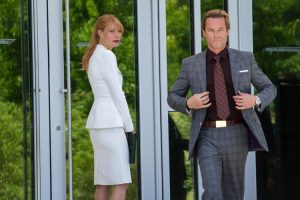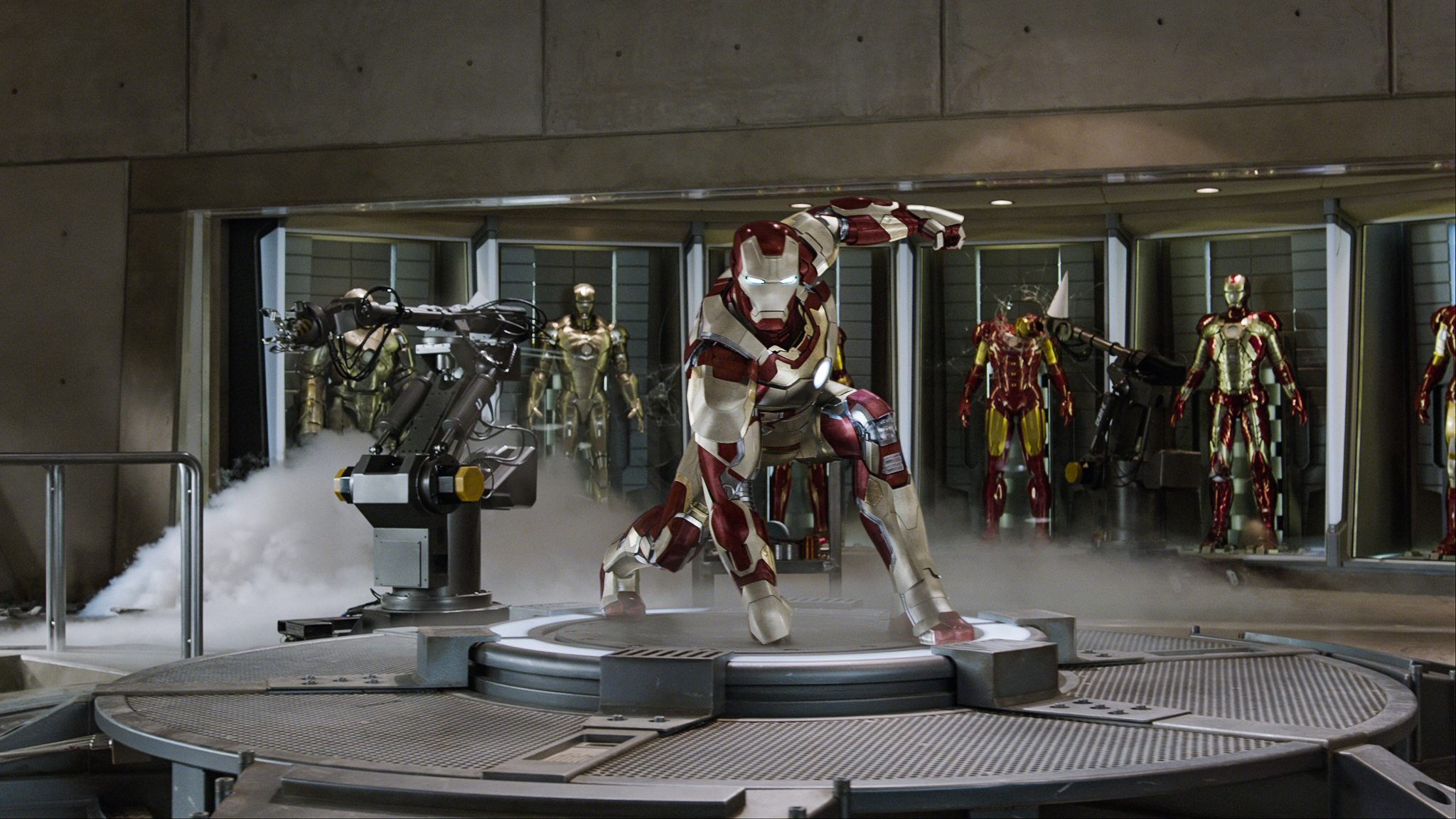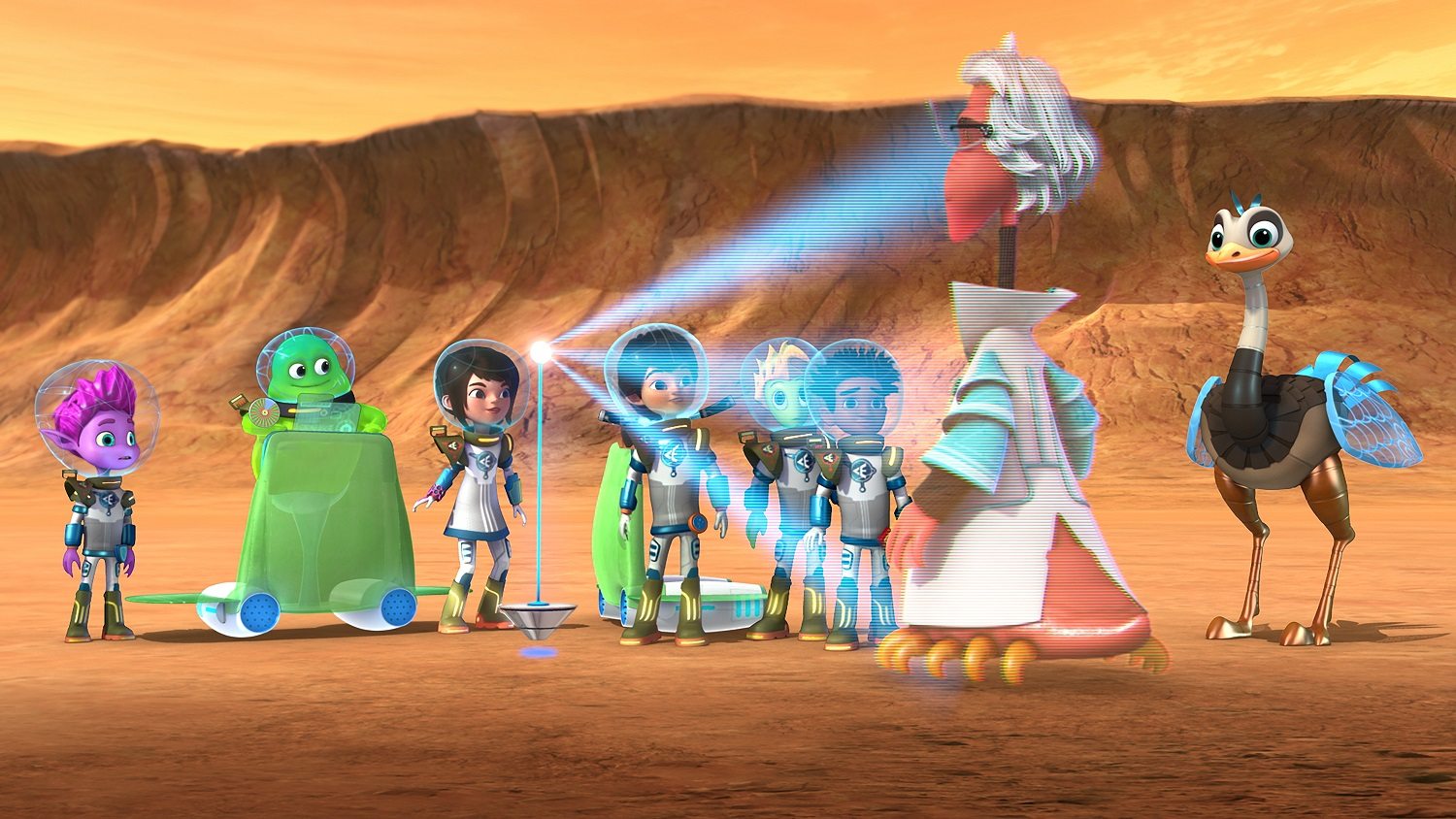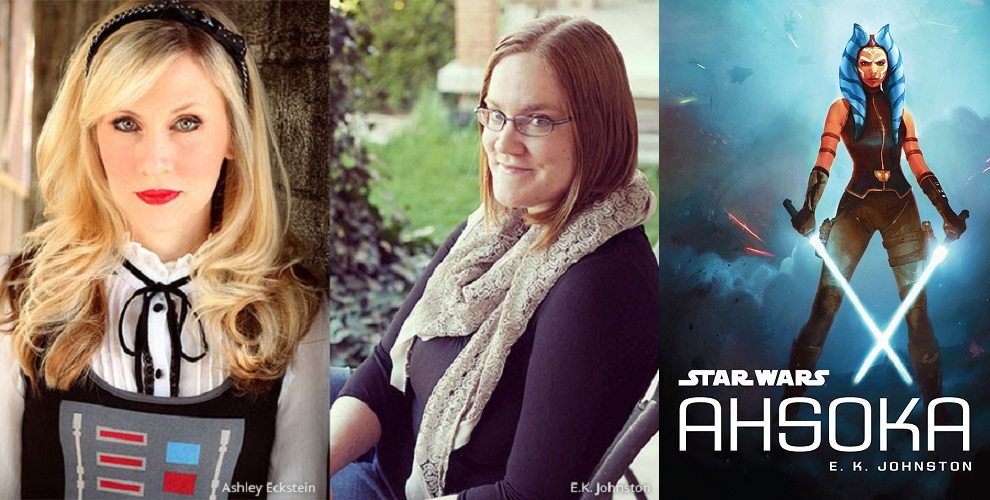 The cast, writers and director of <cite>Iron Man 3</cite> met with members of the press to discuss the film, their characters and the production. Assembled in a ballroom at the legendary Four Seasons Hotel, in two separate press conferences, Robert Downey, Jr., Gwyneth Paltrow, Don Cheadle, and Sir Ben Kingsley in the first, and Rebecca Hall, Guy Pearce, co-writer Drew Pearce (no relation), and co-writer/director Shane Black in the second, they engaged in banter among themselves and answered questions from the assembled journalists, discussing the process of making the film, its place in the Marvel universe, and the unfortunate similarity of certain plot points to recent real-world events. A few excerpts:
The cast, writers and director of <cite>Iron Man 3</cite> met with members of the press to discuss the film, their characters and the production. Assembled in a ballroom at the legendary Four Seasons Hotel, in two separate press conferences, Robert Downey, Jr., Gwyneth Paltrow, Don Cheadle, and Sir Ben Kingsley in the first, and Rebecca Hall, Guy Pearce, co-writer Drew Pearce (no relation), and co-writer/director Shane Black in the second, they engaged in banter among themselves and answered questions from the assembled journalists, discussing the process of making the film, its place in the Marvel universe, and the unfortunate similarity of certain plot points to recent real-world events. A few excerpts:
When asked about the impact of the Boston tragedy on the film:
Robert Downey, Jr.: I’d like to speak for all of us and say that I like entertainers to talk about entertainment, and I think that in a sidebar it’s different. But I think at this level, it’s kind of everyone is having their own personal feelings about it.
Don Cheadle: I think especially with the events of the last week, we’ve been asked a lot – I’ve been a lot, anyway – about if there are any sort of allusions between what’s happening in the real world and what’s happening in the film, and are we trying to make a statement. And clearly this movie was in the can before anything happened, transpired in the last week. But as Robert mentioned earlier, the job of this film is to entertain. That’s what we’re hoping to do. If we’re lucky enough to, outside of that, have someone’s mind changed about something that’s happening in the real world, or sensitivity that wasn’t there before, or some deeper understanding, that’s some ancillary byproduct that we couldn’t have anticipated. I couldn’t have anyway. We’re really trying to give people, I think, the ability to go into a darkened room, and have a couple of hours of just pure enjoyment. And if anything else happens outside of that, that’s an unintended consequence, but one that’s a happy one, I guess.
Gwyneth Paltrow: And, you know, we do live in an unsafe world. That’s the truth and I’m dealing with this now with my seven-year-old. He’s sort of grappling with the fact that the world is unsafe, and there are people who do harmful things. And I don’t think there’s anything wrong with presenting that idea. We can’t lie to our children and pretend that the world is perfect and everybody is happy, and everybody is out there to do good. So, you know, it’s just part of a bigger conversation. I know that after my children saw the movie, I had certain conversations with my son about it. And so I think it’s a good sort of contained place to have a conversation.
On the film’s portrayal of longtime Iron Man villain, the Mandarin:
Downey: I think the big challenge this time was, you know, these movies are only ever as good as their bad guys, and once we cast Sir Ben, half our troubles went away. And then the other half had to do with him executing this very peculiar and awesome arc.

Sir Ben Kingsley: I tried to give the Mandarin in his political broadcasts a rather unnerving sense of righteousness, and make him almost paternalistic, patriarchal. And that’s where the timbre of his delivery comes from, and the weird iconography was there to disconcert and completely scatter any expectations of where he might be coming from. I think again the line that “you will never see me coming” involves … It sort of voices, that unpredictability that he has.
Shane Black: I just thought it was an interesting idea, to try to mix it up so that if you’re gonna do something that involves a terrorist in the modern world, who’s just sort of a villain, who’s just sort of a guy that we’re all afraid of – why not say something about the entire experience of what it would take, for instance, to create a myth that was all things to all people, the true – from elements of traditional historic warfare, like swords and dragons, surrounded itself with icons that were recognizable, like the beard from Fidel Castro and the field cap from, you know, Gadhafi. Why not make an über-terrorist and then play with the idea of that – of a corporate world full of think tanks whose assignment, let’s say, was to cobble together the ultimate warfare specialist, and then have that man’s sole unifying characteristic be his undying hatred for America, such that he attracts to him these acolytes and disciples who respond to the myth. We thought that was an interesting idea, regardless of his ethnicity, you know.
When asked how much of the film was improvised:
Kingsley: Drew and Shane presented us with a wonderful document, and there’s very little straying off the written word. Whenever we do improvise it’s minimal, and just to maybe sharpen one or two ideas that we were playing with on the set, but it’s all there. And I do respond to the written word. I love to see it down there on the page, and it was all there. It’s a great script. It was a wonderful read, and we stuck very closely to it.
Downey: I’d like to offer a counterpoint what Sir Ben said, because he actually, when once we let him off the chain, we found that he was a glorious improviser and a lot of ideas (without giving his character arc) were just flowing out from what was written. But again, you know, Drew and Shane had a good document. The story is really good. The twists are really good.
Cheadle: Shane almost coined and really put a stamp on the sort of buddy action movies where I was clearly in the pocket with Robert. It was great to see the whole movie put together at the end because we’re in such different tracks. I didn’t know what Gwyneth was doing for half of the movie. It was great to see it all put together and say, “Oh, that’s what you guys were doing over there.”
On making a superhero movie for the first time:
Rebecca Hall: I remember going to see the first Iron Man film and thinking, you know, what an unusual thing that they’re not casting action heroes, they’re casting Robert Downey, Jr. and Gwyneth Paltrow. This must be interesting. And I remember watching it and thinking, you know, it’s not just about the action sequences and the thrill ride or whatever. It’s also about the repartee, and the wit, and the dialogue, and there was something of a sort of screwball battle of the sexes comedy going on that I loved. And I thought, you know, that this would be a great thing to be a part of.

Guy Pearce: I think if I feel inspired by a job enough to want to take it on, then any kind of concerns that you have, you’re prepared to sort of face, you know. And I don’t think I really had any concerns that would have stopped me from doing it. I’m certainly aware that there are a lot of fans behind comic strip films, and obviously these Iron Man films. But you know you’re in good hands with these guys. And I think ultimately, you just want to make sure you can bring a truth to the character you’re playing. And as far as challenges, there’s quite a lot of the green screen stuff. I mean, I’d done a bit of green screen stuff before. And it’s, on some level, it’s actually kind of fun, you know, because you’re relying on your imagination. And I think in this, it actually wasn’t so extreme that you were trying to imagine a person in front of you that actually wasn’t there or anything like that. But you’ve got a visual effects team working away constantly, and they’re showing you previews of the scene you’re meant to be doing and then how it’s actually meant to look. So I think, again, you’re in really good hands on a visual sense, as well.
Shane Black replaces Jon Favreau as director this time; there was some discussion of the change and Black’s style as a director:
Paltrow: When I started Iron Man 3, I was very uncomfortable with the fact that Jon wasn’t there directing. And I felt that, Jon cast the movies, and he’s responsible in part for the Avengers, and it was just, you know… and I know lives and everyone is busy, but it was just weird that he wasn’t there directing. But as we went on and I really warmed to Shane and his terrible outfits, and you know, he is the most–he is so sharp. He is so smart and his dialogue was incredible. And I think what we started with on this movie that we didn’t start with on the first two films was a really excellent finished screenplay. And I think it really shows in the film. I think Shane is really super talented, and he brought something. You know, he took it up a notch, which was really difficult to do. So I ended up having an incredible amount of respect for him.
Kingsley: He has a great attribute as a director, one of many great attributes is that the director will give you the role and then he will let go. This is a wonderful quality that he has. There are some directors lesser in confidence or skill who make the actor feel very uncomfortable because you feel you’re auditioning for them everyday. And that’s a terrible feeling on the set. But Shane has this wonderful ability in his own confidence, and his ability to cast a movie to say, “There’s your role. I’m just going to film it.” And it’s really good energy to have on the set.
Black: I can only imagine that having worked previously with Robert contributed to him calling me, and asking me aboard this somewhat more ambitious production. But yeah, I had worked briefly with him and sat with him and Favreau during the inception of the first Iron Man, during those early phases. And I was impressed with the project, I was impressed with both of them, and the chance to have a greenlit picture where I got to work again with Robert Downey and reunite, and also spend time with Jon Favreau, who gave me endless tips and advice on this thing, was just so – too attractive to pass. Our ambitions were to make sure that we had, in fact, a movie that felt like a worthy successor to the two previous Favreau films. And to Marvel’s credit, they said, “We’ve done the Avengers, we made a lot of money. But let’s not do that again right now. Let’s do something different.” And they allowed for a different, sort of stand-alone film, where we got to be more character-centric and look back to basics at what Tony Stark would do next, what was left to tell of his story. And that was very appealing to me. So to make it more of a thriller and to make it more about Tony and less other-worldly, and sort of just ground it more; that was our intention. I hope we succeeded.
Everyone involved credits Robert Downey Jr. as the driving force of the films:
Paltrow: You know, the truth is that these movies work because Robert plays Tony Stark, and not only because of the similarities in their own lives, and not because of his specific brand of vulnerability and strength and humor and all those things, but because Robert has a really big-picture creative mind about what these movies should feel like. We all know that Marvel are amazing at the stunts and the CGI and the action and everything, but I think one particular strength of Robert’s that we don’t see on screen is the fact that he’s always asking, what is the big picture here? How can we make it feel real? How can we make it feel like something we care about and we want to watch? I think that’s why the movies keep working, and they’re not sort of like a weaker carbon copy of the one before.
Kingsley: To pursue Gwyneth’s point that it does come from Robert; whatever the context, whatever the scene, there’s always a quest for sincerity; a quest for the genuine, a quest for putting the human dance on the screen. And all generations will respond to that. Children do respond to sincerity, and Robert, as a guiding actor through our experience, will always debate where is the sincerity in the scene, where is its heart? And I think that will appeal to children of all ages, to use a rather hackneyed phrase.
Guy Pearce: Obviously, working with Robert is something quite specific because he’s, you know, he’s the genius that he is. He’s a lot of fun; he likes to improvise. You’ve really gotta be on your toes.
Iron Man 3 is rated PG-13, though Shane Black is best known for making R-rated action movies. They discussed the challenges of making a family-friendly PG-13 film:
Downey: These aren’t those kind of like PG-13 bordering on “how did this ever get past the Ratings Commission?” movies. You know, we’re really thoughtful about this stuff. And I think even in your character’s transition, there’s something about it that allows the air to be taken out of the darkness that would otherwise be there maybe.
Black: I had done a film for kids previously, called The Monster Squad, but that was ages ago. So coming into this, I had to go back and say, “I remember what it was like when I went to the matinée to stand in line for Empire Strikes Back, or Star Wars, or those types of films, and get excited all over again about that type of adventure – that you could appeal to a family but it was still edgy. You know, I don’t want to – we didn’t want to pander. We didn’t want to make a kiddie film. But we knew very well that we couldn’t, you know, go beyond the boundaries of PG-13.
Drew Pearce: That’s not to say we didn’t push it a little in the first couple of drafts.
Black: Yeah; Tony only said f*** five times in the first draft.
Drew Pearce: That is technically true, and we actually had to have a sit-down conversation about the fact that you couldn’t say f*** in a PG-13.
Black: But you know, but there was a point when you would write for television, when I was coming up in this business, you would just say f*** anyway, and you would just know that they would take it out later. So basically, there was no problem with that. I have no problem with tailoring material to the audience that it’s intended for, as long as you keep the edge – as long as you don’t condescend to that audience, I think that it’s absolutely spot on.
Drew Pearce: Well, we’ve got a brilliant actors, as well, which helps so much because they can give it the swing and feel of grown-up conversation without necessarily having to hit the F-button.
Like several classic action movies, including Shane Black’s Lethal Weapon, Iron Man 3 is set during Christmas. The writers discussed that fact:
Black: Well, it just sort of evolved, oddly enough, with Iron Man 3, ‘cause I had resisted it. It was Drew who talked me into it, eventually.
Drew Pearce: If I was gonna go see a Shane Black Iron Man 3 movie, then it had to be at Christmas; but there’s always a reason for it, as well.
Black: Yeah, there has to be; I think it’s a sense of, if you’re doing something on an interesting scale that involves an entire universe of characters, one way to unite them is to have them all undergo a common experience,and there is something at Christmas that unites everybody; it just sort of already sets a stage within the stage, that whatever you are, you’re experiencing this world together. And I think that also, there’s something just pleasing about it to me, ever since I did Lethal Weapon back in ’87, and we did Christmas, and Joel [Silver] liked it so much he put Die Hard at Christmas, and there was some fun to that.
Drew Pearce: There’s an interesting thing at Christmas, as well, like when you’re telling a story that’s about taking characters apart, it almost has more resonance if you put it at Christmas, and if you’re also telling a story about lonelier characters, as well, then that loneliness is kind of heightened at Christmas, too.
Black: It’s a time of reckoning for a lot of people, where you take stock as to where you’ve been, how you got to where you are now, and the lonely… lonely people are lonelier at Christmas, and you tend to notice things more keenly, more acutely, I think.
Drew Pearce: Plus, there was a kind of “Christmas Carol” thing that we wanted to bring in for Tony, as well, a certain sense of –
Black: Meeting the Ghost of Christmas Past. In the sense that Harley is kind of him, as a young boy, just encountering all these different things that come to him, almost like a fever dream, when he’s at his lowest point. I think that was the idea, as well.
Tony Stark spends a portion of the movie with a kid in rural America, depending on him to help repair his damaged armor. Downey discussed the young actor:
Downey: Ty Simpkins is great and I think we’ll be seeing a lot of him. Shane Black had this idea of this kind of capraesque departure. I mean a lot of things in Iron Man 3, I think we all knew we were taking risks, and we were kind of out of what would have been the familiar territory. And his idea of a super hero running into a little kid in the heartland of America, I think wound up being a wise choice and of a calculated risk.
I just like the idea of this kid kind of getting under my skin, and I like the idea of kids bringing their parents to the verge of an anxiety attack. And kind of going like, “Oh, what’s wrong with you?” Once they push you there. And I thought that was a nice way to refer back to [The Avengers]. We needed reasons, and sometimes you can just look at the bigger picture of this now kind of like continuance of stories, you know.




